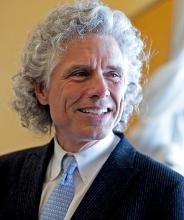What Is It
Human thought is an amazing thing. It has given us not only science, literature, and morality, but also superstition, slavery, and war. Thought has the power to uncover the deepest mysteries of the universe. Or to create new realities – social realities. But what makes human thought so powerful? John and Ken put this question and more to renowned cognitive scientist Steven Pinker, author of the best-selling The Language Instinct: How the Mind Creates Language and The Stuff of Thought: Language as a Window into Human Nature.
Listening Notes
Ken begins the discussion by distinguishing three kinds of thought: belief, desire, and intention. Beliefs (such as, ‘there is a beer in the fridge’) may be true or false. Desires (such as, ‘I want beer’) may be satisfied or unsatisfied. Intentions (such as, ‘I will go get a beer’) are what drive us to action. What these all have in common, though, is that they are built from concepts or ideas (such as ‘beer’). Psychologist Steven Pinker enters the fray, and makes two initial points: concepts with many words (such as the infamous and apocryphal Eskimo ‘snow’) demonstrate our sensitivity to different aspects of things; words with contextual definitions (such as 'I' or 'this') establish perspective and isolate objects. Our guest later points out that difference between words (such as ‘stool’ and ‘shit’) can reflect not ideas, but social attitudes.
The discussion then moves to the possibility of a perfectly logical language, such as hoped for by Frege, Russell, and Quine. Steven thinks this ignores the usability of language – that it must be learnable, speakable, hearable, and thinkable. If language does have a logical kernel, it nonetheless makes many compromises in the name of utility. As a Darwinian, he must see it as having consequences for survival. For this reason, he sees language as primarily existing to facilitate communication and action (contra Chomsky).
Steven enumerates three features that make the human species weird. First, we openly communicate with members outside our immediate family group. Second, we use technology to enhance our natural powers. Third, we have language. For Steven, all three demonstrate one essential fact: for we humans, know-how is the highest commodity. It is (relatively) easy to exchange, providing large benefits at minimal cost. However, language is ‘digital’, and thus cannot express anything ‘analog’ or multidimensional, such as tying a tie and doing a dance.
The conversation ends with a question from John regarding the theological significance of language. Steven does not have much time to answer, but he comments on the historical conviction of humans that words have the power to change reality (prayer is a good example). One should not forget the first verse in the gospel according to John: “In the beginning was the Word.”
- Roving Philosophical Reporter (Seek to 4:35): Angela Kilduff speaks to folks on the street of San Francisco about what they think thought is. Some respond that “they haven’t thought about thought”. Others provide answers similar to the definition given by Ken; others give answers that are truly novel.

Comments (1)
Harold G. Neuman
Saturday, December 21, 2019 -- 11:10 AM
If memory serves, this showIf memory serves, this show was aired before I became interested and involved myself with Philosophy Talk. I was becoming interested in Pinker's work and had read some of it with appreciation. At round that time, I also began to read philosophy and to think about what I thought about that. Now, in December of 2019, I am actively pursuing the notion of consciousness and have written several short essays on the topic. I believe the level of thinking of which humans are capable is the primary reason why we obtain to the level of higher order consciousness that we do. This is probably not news, but inasmuch as people are still trying to explain consciousness, it ought (seems to me) to be clear that once we have plumbed the depths of thinking, we shall have also arrived at some workable definition or explanation of consciousness. Simply put, without the power of human thought, there would be no human consciousness. I mean, we would not even be able to think of such a thing, would we?